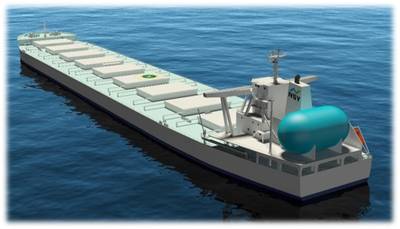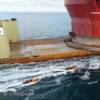Japanese Steelmaker to Charter Three 210,000-dwt LNG-fueled Bulk Carriers
Japanese steelmaker JFE Steel has signed long-charters shipping firms NYK Line, Kawasaki Kisen Kaisha and Mitsui O.S.K. Lines to charter three 210,000-ton LNG-fueled bulk carriers for transporting iron ore and coal from overseas locations to JFE Steel’s steelworks in Japan.
JFE Steel said the charters would make it the first company in Japan to deploy LNG-fueled ships in the 210,000-ton class, and said the move would help it cut emissions.
The ships, which have been designed by Nihon Shipyard and will be built by Japan Marine United and Imabari Shipbuilding, are scheduled to be completed successively from the beginning of 2024.
Each ship will have an overall length of less than 300m, a beam of up to 50m, freeboard of up to 25m, and draft of up to 18.4m. The maximum gross tonnage will be 110,800 tons and the maximum deadweight capacity will be 210,000 tons. JFE Steel did not share the financial details.
"JFE Steel’s shift to LNG-powered transportation will support global efforts to create a more carbon-neutral world by reducing greenhouse gas emissions generated during international shipping. Using LNG instead of conventional heavy-oil fuels can reduce emissions of carbon dioxide by around 25-30%, sulfur oxides by roughly 100%, and nitrous oxides by around 85%," the company said.
JFE Steel, which has plans to become carbon neutral by 2050, also said it would consider using zero-emission ships powered by other eco-friendly fuels such as ammonia and carbon-recycling methane.
In a separate statement, NYK Line shared more info on the vessel it will lease to JFE Steel.
The vessel will be the first LNG-fueled capesize bulk carrier to be built by NYK, and will be equipped with a WinGD-made dual-fuel slow-speed diesel engine and compliant with IMO’s NOx (nitrogen oxide) emission regulations (Tier III)
"This ship will emit approximately no sulfur oxides (SOx), 85% less NOx, and 25-30% less carbon dioxide (CO2) compared to conventional heavy oil-fueled vessels," NYK Line said.














